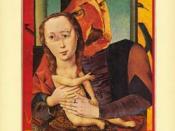Atwood, Margaret. The Handmaid's Tale. Toronto: McClelland-Stewart, 1985, Seal Books edition 1998
In "The Handmaid's Tale" one of the main themes is the influence of government. All areas of peoples' lives are controlled by the government, which is a totalitarian regime. The government in Gilead rules with the political concept that the citizen should be totally subject to an absolute state authority. The state in this case believes (or at least tells the people it is governing) that it gets its authority to rule from the bible. The state doesn't allow the people to read so there is no opportunity for the people to question the states authority.
Margaret Atwood takes certain social trends she sees happening today and exaggerates them to show the reader their most negative qualities. Christian--Fundamentalists, after a coup where they execute Congress and the President, take away the freedom of Americans. Reading has been outlawed; personal property is not allowed and families are broken apart.
The reason for this is partly because environmental pollution has made most of the human race sterile. The Handmaids Tale doesn't predict the future but looks at the attitudes that are typical of the religious right that the author finds ominous in North America today. In the story a revolution results in a large part of America being ruled by the "Republic" of Gilead, a society that rules through oppression, deprivation, and threat of execution. There are a lot of similarities to cultures in the Middle East where the ruling body derives its authority from religous sources, so the reader is not allowed to get comfortable in the thought that this could never happen. Interpretations of the bible can be slanted any way the ruling party wants which is why in our society we have always tried to separate...


